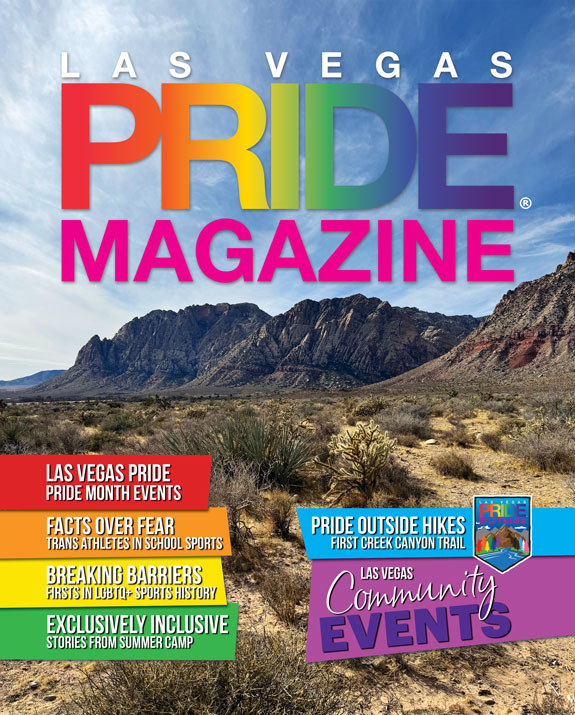Shifting Gears:
Olympic Gold Medalist Connor Fields on His Act Two
By Stacey Gualandi
Photography courtesy of Connor Fields
Olympic Champion-turned-keynote speaker Connor Fields certainly knows how to deliver an opening line.
“I was the best in the world at a sport that people care about for one day every four years.”
For the next 10 minutes, the BMX “pedalist” and gold medalist kept the audience—including myself—hanging on his every word at a recent TEDx event in his hometown of Las Vegas.
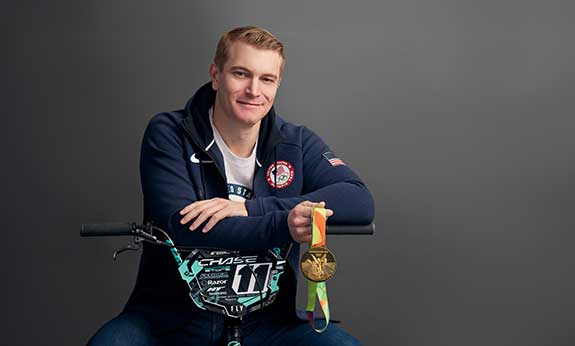
Connor Fields
This talented talker on two wheels pulls from nearly 20 years of supreme highs and devastating lows on and off the bike to help us all reach our pivotal moments, navigate unexpected outcomes, and move forward, win or lose, like champions.
It’s been a challenging journey, but Fields says we can all learn to answer the question “Now what?”
“If one person changes their decision-making process after hearing my talk, and is a little more intentional with their decisions, that feels so good to me now,” says Fields.
During his motivational keynotes, Fields also emphasizes perseverance, mental resilience, and self-acceptance, reinforcing the importance of supporting marginalized communities, including LGBTQIA+ individuals.
“It’s like Act Two, if you will, in my life. It’s all about helping others, while Act One was all about myself.”
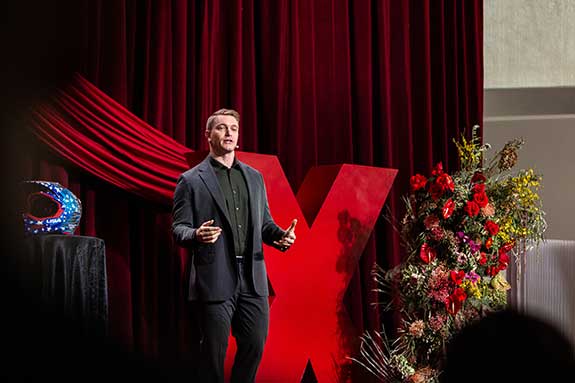
Photo of Connor Fields on stage at TEDxLasVegas by Midnight Creative Agency
Fields was seven when his mother took him to a local Las Vegas BMX racing track.
“I loved it,” says Fields. “This was it. This was the sport for me.”
Years later, when BMX racing was included in the 2008 Olympic Games, Fields declared he would win an Olympic gold medal one day.
“I spent four years of dedication and working every single day towards that goal,” says Fields. “But then I found myself sitting in the starting line for the 2012 Olympic Games in London, at just 19 years old, in the pole position, the number one seed. The odds makers, the commentators, everybody had me picked to win, and I completely blew it. I choked.”
For the first time, Fields had to ask himself, ‘Now what?’
After a bout with “depression, shame, and embarrassment,” he vowed never to go into any situation unprepared again.
“I knew that I was capable of more, and I didn’t like knowing that I didn’t do my best,” says Fields. “It all hit me that night after the Olympics when I was brushing my teeth because that was the first time I looked in the mirror. I just started bawling because that was the first time I had to look at myself and realize that.”
Four years later, at 23, he returned to the 2016 Olympics in Rio de Janeiro, Brazil, and won the first-ever gold medal for the United States in BMX Racing.
But at the 2021 Games in Tokyo, after earning the top spot on Team USA for the third time in a row, Fields suffered one of the worst accidents in the Olympics’ history.
“I had broken ribs, a collapsed lung, torn shoulder ligaments, a torn bicep, and the big one: a traumatic brain injury. I had bleeding on four different parts of my brain, injury to my frontal lobe, my parietal lobe, my corpus callosum, and my brain stem as I lay there on the track, not breathing. The initial concern was if I would survive,” says Fields. “If you Google my name, you just see a bunch of pictures of me dead on the track.”
Recovery took Fields a grueling 18 months of rehabilitation to get his life back. Miraculously, Fields says he now feels good and “normal” but just requires more sleep.
“It’s such a part of my life that the idea of running from [the accident] or trying not to acknowledge it doesn’t really make sense to me,” says Fields.
“As cheesy as it sounds, I genuinely don’t sweat the small stuff as much as I used to after going through an experience like that. How does it not change you? How does it not make you stop and smell the roses? Literally, like stop and smell the roses and see the beauty in every day.”
The 8-time World Cup winner has completely shifted gears in the four years since his accident.
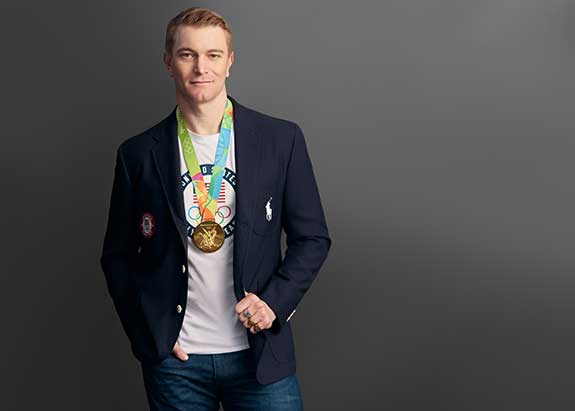
Connor Fields
“I was in an individual sport, so I’m on Team Connor. I’m on Team, excuse my French, ‘Team F*** Everybody Else,’ because it’s just me,” admits Fields. “For me, helping others fills my cup so much more than my own individual success.”
Fields is currently on the Board of USA Cycling to help enact positive change in the sport and is involved with the USA BMX Foundation’s RISE program for underprivileged kids near its headquarters in Tulsa, Oklahoma.
RISE stands for “resiliency, inclusion, social awareness, and education.” It is a three-month mentorship and education program in which 30 children will build a bike, receive coaching from BMX professionals, and meet community leaders and industry influencers.
He also advocates for an inclusive and welcoming environment in BMX racing and encourages diversity and representation in what is traditionally a male-dominated sport.
“When I started [in 2000], Women’s BMX was an afterthought,” says Fields.
In the 2008, 2012, and 2016 Olympics, Fields says there were 32 men and 16 women competing, but by 2020, the numbers were equal, with 24 men and 24 women.
“The women’s side has really progressed, and those women are badasses,” says Fields of the many Team USA elite women training with the boys.
“A lot of the women are LGBTQ. The Olympic Silver medalist for Team USA in Paris, whose name also happens to be Perris [Benegas], is gay.”
His close friend Brooke Crain, a two-time Olympian BMX racer, publicly came out in 2018 via Instagram. She took 4th place at the Rio Games where Fields won Gold.
“It was funny because [Brooke] had this whole big coming out. She was really nervous … and we’re all like, ‘Okay.’ None of us cared. We were just like, ‘Cool!’”
Fields believes that “coming out “ is all about being comfortable in one’s own skin.
“Really, at the end of the day, it comes back to every decision you make matters. Are you deciding to be your authentic and true self? Are you deciding to continue keeping people in your life who are not good to you? Are you deciding to allow what other people think of you to be more important than what you think of you?”
Making difficult decisions is very relatable because we all face what-do-I-do-now decisions at different moments throughout our lives.
“I don’t have any specific examples of people coming up to me and saying, ‘Hey, you inspired me to come out,’ but I think that a lot of my teammates over the years have always been like, ‘Hey, it’s just great that you just treat us the same,’” says Fields.
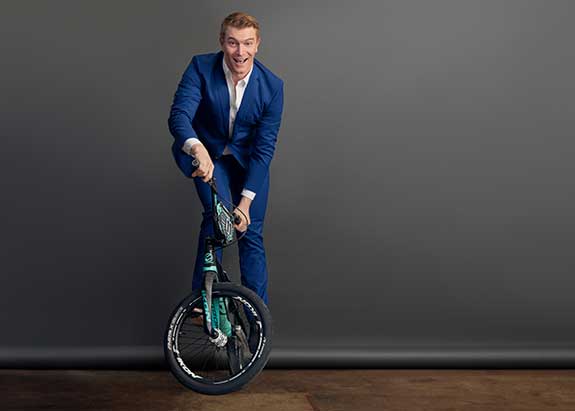
Connor Fields
“I think that’s where I’m at. Some people like blue, some people like green, some people like hot dogs, some people like hamburgers. Like, who cares? If nobody’s hurting anybody, it’s not a big deal. The decisions we make shape our reality. They create our future. What are you doing to serve others? What are you doing to continue learning and bettering yourself? Are you taking care of your physical and mental health?”
Now, Fields is no longer living his life according to a four-year Olympic plan, but he isn’t spinning his wheels.
Last year, he made his Olympic reporting debut for NBC, covering BMX Racing and Freestyle events at the Paris Games and the Super Motocross finals in Las Vegas.
He connects with new audiences as host of the PBS show “Outdoor Nevada.”
He’s coaching kids on learning how to ride bikes.
Oh, and he is planning to elope with his fiancée, Emily Tucker, in the Colorado mountains.
For Fields, putting his mind to something is well, just like riding a bike.
“I do have things I’m working on and enjoying, but I’m equal parts enjoying and anxiety-induced by not having an overarching end goal,” admits Fields.
“My entire life that I can remember, there was a shiny carrot at the end that I was going for, so [with the help of a sports psychologist] I’m…trying to learn to just take it one day, one month at a time, but the control freak in me now is like, ‘I have no clue what I’m going to be doing next year.’ That is a little bit of an adjustment.”
Fields has given talks everywhere from schools to universities; Narcotics Anonymous to Hope For Prisoners, even thousands of people at a real estate conference and he has no plans to put on the brakes. He remains a committed “spokes”-person for the “Now what?” crowd.
“The more people that I can try to help, the better,” says Fields. “I don’t care if they’re kids, if they’re in high school, if they’re in college, or if they’re in a retirement home. It doesn’t matter to me. I just love the feeling of helping others in any capacity.”
So, if you think Connor Fields is only good with an opening line, get a load of his closer.
“At the end of the day, look at yourself in the mirror while brushing your teeth and be proud of your effort,” says Fields. “That’s the way that I try to live my life in everything that I do.”
Visit Connor’s website at: www.connorfields.com
This article was originally published in the 2025 Sports & Recreation Issue of Las Vegas PRIDE Magazine, and can be read in its original format here.

